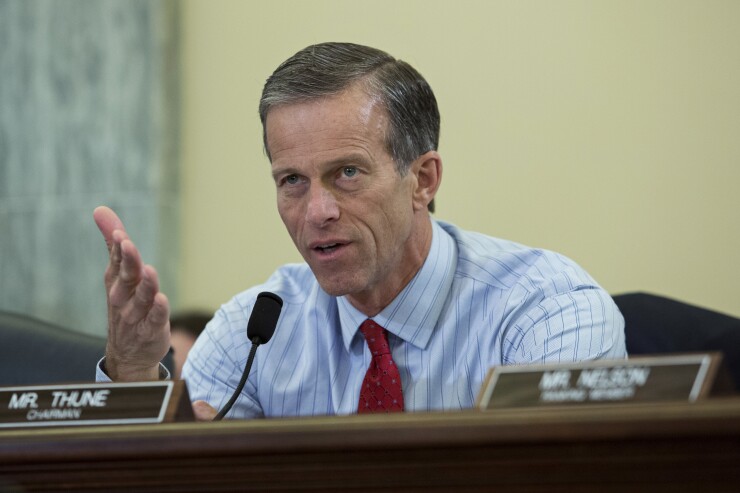DALLAS -- A coalition of more than 50 conservative groups pressed President Trump to ensure strict attention to “fiscal responsibility” when it comes to funding the transportation infrastructure, while Sen. John Thune said it could be next year before Congress is able to consider any infrastructure plan.
“We write to encourage you to prioritize fiscal responsibility while addressing the nation’s infrastructure needs,” the coalition wrote in the May 11 letter.
“Previous transportation spending policies shepherded by the Obama administration — the 2009 ‘stimulus’ and all its attendant boondoggles — were chock-full of waste and pet projects and made the nation's fiscal problems worse,” the groups wrote.
The letter was signed by officials from Heritage Action for America, the Club for Growth, Americans for Prosperity, Tea Party Nation, the Competitive Enterprise Institute, and others.
Trump administration officials have said a comprehensive infrastructure package, which may include broadband and hospitals as well as roads and bridges, will be unveiled soon. So far, few details have been provided the $1 trillion, 10-year infrastructure plan Trump floated in October, other than it will rely heavily on tax credits and private investments.
The infrastructure proposal will include $200 billion of direct federal funding in addition to incentives that would help attract private dollars to projects, according to Transportation Secretary Elaine Chao.
Meanwhile, Thune, a Republican from South Dakota who chairs the Senate Commerce, Science, and Transportation Committee, said Wednesday that time is running out for Congress to consider an infrastructure funding measure this year.
"From a scheduling standpoint, yeah, it's going to be hard," Thune told reporters. "We've got to do the budget to do tax reform and finish health care first. Now the administration is saying they want to do infrastructure outside of tax reform, so it could be something that gets pushed. The timing is still kind of an open question, I think.”

In the letter to Trump, the conservative coalition cautioned against funding the infrastructure plan through a national infrastructure bank or new revenues obtained from tax reform to repatriate overseas corporate earnings.
“Any new spending should be offset with spending cuts, not tax increases nor budget gimmicks,” the coalition said.
The concept of using tax revenue from repatriated corporate earnings to fund roads and bridges “has little to do with transportation issues and instead is a symptom of our broken federal tax code that should be addressed in the context of comprehensive tax reform,” the letter said.
State allocations from the Highway Trust Fund should be limited to highway and bridge projects, the groups added.
“Infrastructure dollars should go toward core projects, not on ancillary projects like highway beautification and public transit,” they said.
The letter also urges transportation policy makers to eliminate lengthy environmental impact studies that “increase project costs and drag project timelines” and repeal the Davis-Bacon law that requires contractors to pay the local prevailing wages on federally funded public works projects.
“Forthcoming transportation plans should be an opportunity for Congress and the Trump administration to further relieve the economy from bureaucratic and regulatory hurdles while maximizing taxpayer dollars,” the coalition wrote.
Raising the federal gas tax to fund transportation infrastructure would be a mistake, said Christine Harbin, vice president of external affairs for Americans for Prosperity.
“Conservative organizations overwhelmingly oppose a gas tax increase,” she said. “The good news for American families and businesses is that conservatives in Congress have little appetite to pass a gas tax hike.”
The infrastructure letter is a concise statement of conservative principles, said Mariya Frost, director of the Coles Center for Transportation at the Washington Policy Center in Seattle.
“Establishing principles first, I think, is important,” she said. “We’re a think tank, not an advocacy group, and we usually don’t sign letters like this. But we did because it represents virtually every public policy that we’ve advocated for years.”





